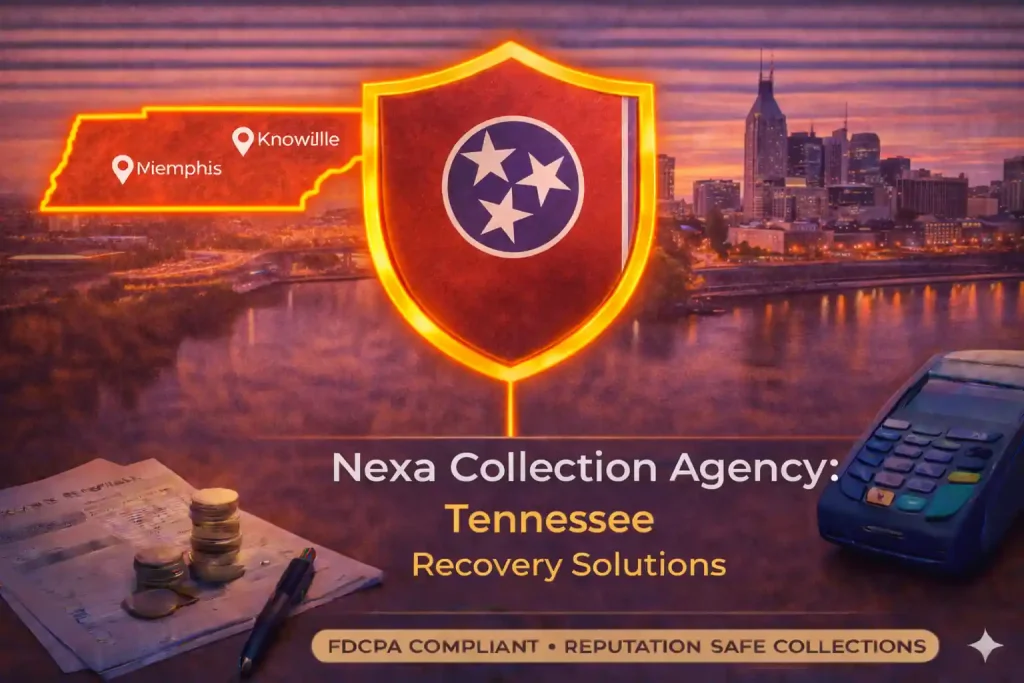In Tennessee—from the healthcare hubs of Nashville and the logistics powerhouses of Memphis to the manufacturing centers of Knoxville and Chattanooga—your cash flow is the engine of your success. But as of January 1, 2026, the rules for getting paid have fundamentally shifted. With the full implementation of the Tennessee Debt Resolution Services Act and the landmark July 2025 ban on medical debt reporting, the traditional “threat” to a credit score is officially dead. You don’t just need a collector; you need a Tennessee-licensed strategist who can secure bank levies and property liens to recover your revenue while shielding your business from aggressive “consumer protection” litigation.
Nexa provides 100% reputation-safe, equipped with all 50-state collections license, offering free credit reporting, free litigation/bankruptcy scrubs, and zero onboarding fees. Secure – SOC 2 Type II & HIPAA compliant.
Need a Collection Agency? Contact us
The Tennessee Legal Landscape
Tennessee rewards creditors who act within the 6-year window but requires surgical precision regarding the state’s unique “dependent-based” garnishment math.
| Debt Category | Statute of Limitations | TN Code Annotated (T.C.A.) |
| Written & Oral Contracts | 6 Years | T.C.A. § 28-3-109 |
| Medical Debt | 6 Years | SB 0402 (2025 Reporting Ban) |
| Wage Garnishment | 25% Cap (Less Dependents) | T.C.A. § 26-2-106 |
| Mechanic’s Liens | 90-Day Window | T.C.A. § 66-11-115 |
| Judgments | 10 Years (Renewable) | T.C.A. § 28-3-110 |
Critical Tennessee Rules for 2026:
-
The 6-Year “Golden Window”: Unlike states with 3-year “cliffs,” Tennessee gives you 72 months to file a lawsuit on most debts. Nexa audits your older ledgers to find “found money” from 2021–2023 that other agencies assume is expired.
-
The Medical Reporting Ban (SB 0402): As of July 1, 2025, healthcare providers and agencies are prohibited from reporting medical debt to credit bureaus. Nexa has already pivoted to a “Mediation-First” judicial model, focusing on securing voluntary payment plans or judicial bank attachments to maintain your leverage.
-
The “Dependent” Garnishment Shield: Tennessee is unique; in addition to federal protections, debtors can exempt an extra $2.50 per week for each dependent child under 16. Nexa’s skip-tracing team identifies household size early to ensure your legal spend results in actual checks.
-
The 90-Day Construction Cliff: For remote contractors and suppliers, you must serve a Notice of Nonpayment within 90 days of the last day of the month work was performed. Nexa triggers demand mediation immediately to protect your lien priority.
Cost-Effectiveness: The Nexa Advantage
-
Fixed-Fee Recovery ($15/account): Ideal for early-stage B2B and high-volume medical balances. Debtors pay 100% directly to you.
-
Contingency Fee Service (20%–40%): Performance-based recovery. No Recovery = No Fee.
Industries We Serve in Tennessee
-
Healthcare, Dental & Medical: 100% HIPAA-compliant. We are the masters of SB 0402 compliance, helping Nashville and Memphis practices recover funds without violating the 2026 reporting ban or the Tennessee Consumer Protection Act.
-
Manufacturing & Logistics: B2B recovery for automotive and steel suppliers in the “Crossroads of the South.” We handle high-value freight brokerage and warehousing disputes for the Memphis shipping hub.
-
Construction & Trades: Revenue recovery for HVAC, electrical, and general contractors. We specialize in T.C.A. Title 66 and meeting the strict 90-day recording deadline.
-
Colleges & Universities: From the UT System to private institutions, we manage tuition recovery with a focus on student-first mediation and institutional reputation.
-
K-12 Private & Charter Schools: Diplomatic recovery for unpaid enrollment fees, tailored for Tennessee’s growing school choice landscape and the ESA program.
-
Accountants & CPA Firms: Recovery of professional service fees. We understand the “net-30” billing cycle and use professional mediation to ensure you get paid without damaging client rapport.
-
Banks & Credit Unions: Expert handling of delinquent consumer loans and deficiency balances using Tennessee’s renewable 10-year judgment potential.
-
B2B Commercial, Restoration & Waste Management: High-speed recovery for service providers in the booming Nashville and Knoxville markets.
Recent Tennessee Recovery Results
Case 1: Nashville-Area Multi-Specialty Clinic (Medical)
-
The Problem: $128,000 in patient debt. The practice was paralyzed by the 2025/2026 medical credit reporting ban.
-
The Result: Nexa implemented a compliant “Judicial Mediation” strategy, recovering $84,000 in 65 days through bank attachments and professional settlement plans.
Case 2: Memphis Logistics Broker (B2B)
-
The Problem: A $55,000 unpaid freight invoice from a regional distributor. The debtor stopped responding after a management change.
-
The Result: Utilizing Tennessee’s 6-year written contract statute, Nexa secured a full $55,000 recovery plus interest in just 22 days by presenting a litigation-ready pre-legal demand.
Frequently Asked Questions (FAQ)
1. Can I really collect a debt from 5 years ago in Tennessee?
Yes. For written, oral, and medical contracts, T.C.A. § 28-3-109 allows for a 6-year window. Nexa specializes in reviving these older, high-value accounts that other states would have written off.
2. How much can I garnish from a debtor’s paycheck in Tennessee?
Tennessee follows federal limits (lesser of 25% or amount over 30x min wage) but adds a $2.50 per dependent child exemption. Nexa performs this math automatically to ensure your legal efforts are profitable.
3. Does Nexa handle the 2026 medical reporting bans?
Yes. Since we cannot report medical debt to credit bureaus in TN, we shift our focus to professional mediation and legal judgments to ensure your practice remains profitable without violating the 2026 reporting laws.
Ready to Recover Your Revenue?
Contact us for a no-obligation Tennessee quote and plan today.
Popular cities:

